Kansas City brought so much exceptional work to local stages this year that narrowing this list to 10 became a Solomon-like exercise. It’s hardly a comprehensive survey (and it’s in chronological order): No mortal could attend every presentation of classical music, theater, and dance here (more than 500 annually, by my estimate). But I saw enough to get a sense of the range, scope, and quality of work being produced on a frequent basis.
January: Metropolitan Ensemble Theatre: The Iceman Cometh
Eugene O’Neill’s murky milestone of 20th-century theater (which might also be called A Buncha Drunk Guys Sitting Around Talking), shows that hope and kindness can shine forth in the most dismal of situations. The MET’s shattering production, which featured John Cleary as Theodore “Hickey” Hickman and 18 (!) other actors, shows what is possible when everyone involved is 100 percent committed. Robert Paisley directed what was, for many of us, possibly the only chance we’ll ever get to see a this three-hour-plus gabfest live. It brushed aside any doubts about this play’s relevance: It still stands as a great moment in American theater.
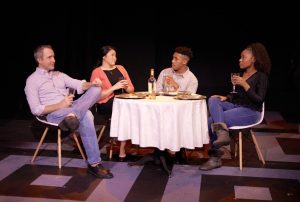
For its production of Smart People, Actors Theatre cast Brian Paulette, Ai Vy Bui, Terrace Wyatt Jr., and Ashley Kennedy. / Photo by Mike Tsai.
January: Kansas City Actors Theatre: Smart People
Lydia R. Diamond’s merrily over-the-top play uses wit to charm us into pondering deeply serious conversations about race, class, politics, and sex. Actors Theatre was in top form under Ile Haggins’ sure-footed direction, with a stellar cast that brought out the humanity of folks just trying to get through life in one piece.
In May, the company bought us Kate Hamill’s loopy adaptation of Little Women, again with a top-drawer cast. In this openly feminist version, Jo asserts her independence rather than toddling off to marry Bhaer: which is possibly in keeping with Alcott’s original intention.
January-March: Coterie Theatre: Only One Day a Year
Years from now, we will pinch ourselves to remember that we lived at the same time as one of America’s foremost playwrights: Michelle Tyrene Johnson, who grew up in Kansas City, Kansas. Her latest hit was given a hugely successful premiere at The Coterie Theatre, directed by Teresa Leggard and Sidonie Garrett.
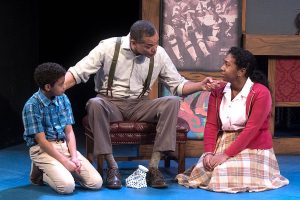
Bernard (L. Roi Hawkins) chats with son Frank (Patrick McGee, Jr.) and daughter Rose (Dominique Lorae), in Only One Day a Year.
It tells of a young Black boy who, for his birthday, wants nothing more than to ride the roller-coaster at the city’s old Fairyland amusement park, which unfortunately allowed Black customers “only one day a year” (in the play, and in real life). Through vivid storytelling and beautifully crafted dialogue, Michelle shows the human impact of racial exclusion.
February: Kansas City Ballet: Cinderella
Devon Carney’s new full-length ballet, set to Prokofiev’s peerless 1945 score, is built on solid narrative. Created to mark the artistic director’s 10th anniversary with the Ballet, the production carves out a believable relationship between Cinderella and the Prince. What stood out, especially, was Naomi Tanioka, who danced the title role on the evening I attended. She was a model of stillness and grace, and her duets with Andrew Vecseri were achingly romantic. Even when the raucous Stepsisters begged for attention, one continued to notice Naomi’s quiet, gleaming presence.
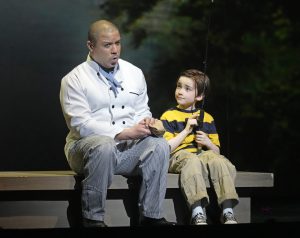
Dick Halloran (Aubrey Allicock) sings to Danny (Tristan Hallett), in a touching epilogue to The Shining. / Photo by Ken Howard
March: Lyric Opera: The Shining
Stephen King’s The Shining is ideal for opera because it is already fundamentally “operatic” in its excess and lurid terrors. Composer Paul Moravec and librettist Mark Campbell went back to the novel, with hardly a glance to the film. Eric Simonson directed, and the excellent cast included Edward Parks and Kelly Kaduce as Jack and Wendy. The marvelous Aubrey Allicock very nearly stole the show in the critical role of Dick Halloran. But as much as opera is a collaborative effort with many moving parts, it is Paul’s music that gives this work its essential vitality.
April: Bach Aria Soloists: Handel in Love
It should not surprise me that Bach Aria Soloists would create one of the year’s highlights, as they have been producing top-drawer concerts for nearly a quarter-century. Handel in Love delighted with its elegant mix of instrumental works and operatic arias and duets, the latter sung with enormous stylistic savvy by Soprano Sarah Tannehill Anderson and Tenor Kyle Stegall. The crystal-clear acoustics of the renovated Westport Presbyterian Church helped make the case for this sensuous music.
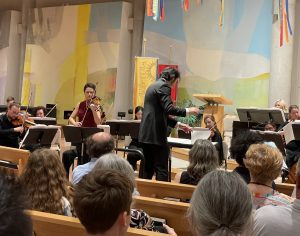
Véronique Mathieu commanded the fiendishly difficult solo part of the Vivaldi/Richter Four Seasons, while Shah Sadikov conducted the NAVO Chamber Ensemble.
May: NAVO: Serenades for Mother’s Day
NAVO has presented an incredibly wide range of music since its founding in 2015. Having heard my share of re-imagined versions of Vivaldi’s Four Seasons, I was mildly skeptical about Max Richter’s “recomposition.”
The sunny program opened with Dvorák’s pleasant-enough Serenade for Strings, but nothing prepared us for the high-tension freight-train that this chamber ensemble, led by Shah Sadikov, was about to drive through Atonement Lutheran Church. Violinist Véronique Mathieu played the frenzied, minimalist solo part with rare ferocity.
October: Harriman-Jewell Series: Hilary Hahn, violin
This performance of three of Bach’s Sonatas and Partitas was not just a concert, it was an evening of high drama. Hilary’s precision and propulsive energy held your attention for such long periods that you had to remind yourself to breathe. At the end, she asked if we wanted “a long or a short encore,” and of course we all knew that the long one was the D-minor Chaconne, which she played with incendiary conviction.
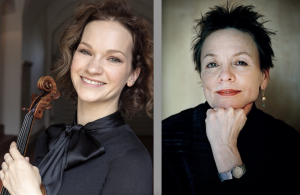
Hilary Hahn, left, photo by Dana van Leeuwen / Laurie Anderson photo by Tim Knox
The Harriman-Jewell Series presented several other gems during 2023, including Laurie Anderson’s multi-media Amelia Earhart tribute (February 18th), with Dennis Russell Davies leading the Filharmonie Brno. On February 26th the Chicago Symphony and Riccardo Muti invited Violinist Julia Fischer to Helzberg Hall, and on November the 3rd the Folly Theater was sold out for Disney Pixar’s Coco in Concert, “performed” with live accompaniment by the Orquesta Folclórica Nacional de Mexico.
October: Kansas City Symphony: Don Quixote
Richard Strauss’ tone poem based on Cervantes is like an extended concerto for solo cello (representing Quixote), with occasional interjections by his faithful companion, Sancho Panza (solo viola). Principal Cellist Mark Gibbs gave one of the richest, most heart-rending performances of this musical chronicle that I’ve ever heard. He was joined by a relative newcomer to the Symphony, Principal Violist MingYu Hsu, who made a similarly powerful impression.
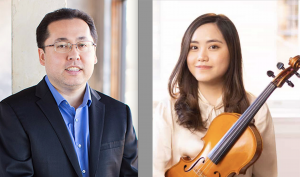
Mark Gibbs and MingYu Hsu performed Don Quixote with the Kansas City Symphony
In March, Matthias Pintscher led the Symphony in one of the most remarkable concerts I’ve heard them play in 24 seasons. On May 9th, the Symphony announced that Matthias would become its fifth music director next season. We are in for quite a ride.
November: Friends of Chamber Music: András Schiff, piano
We arrived at the Folly Theater having no idea what Sir András Schiff was going to play. These days he likes to “let the spirit lead,” and apparently it did. This was probably the largest audience the Friends has ever drawn to a solo recital, and at nearly three hours, one of the longest recitals in the city’s history. We were completely engrossed, as one of the greatest pianists of our time performed Bach, Haydn, Mozart, Schubert, and especially Beethoven (the Bagatelles, Op. 126 and the Piano Sonata, Op. 109).
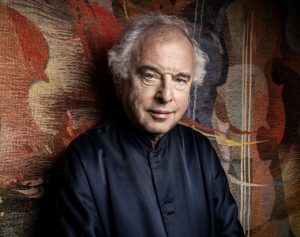
Sir András Schiff / Photo by Nadja Sjöström
The Friends were responsible for several remarkable programs in 2023, mostly notably Boston Camerata’s semi-staged Dido and Aeneas (March 24th) and Richard Goode’s fresh, uncannily spontaneous performance of Beethoven’s Diabelli Variations (May 12th).
To reach Paul Horsley, performing arts editor, send an email to paul@kcindependent.com or find him on Facebook (paul.horsley.501) or Twitter/Instagram (@phorsleycritic).